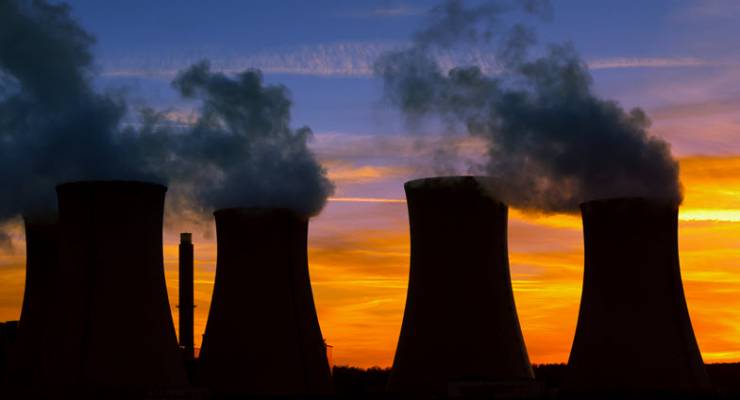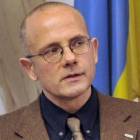
One of the most dangerous and far-reaching repercussions of Russia’s invasion of Ukraine is the subversion of the Nuclear Non-Proliferation Treaty (NPT) — perhaps the most critical multilateral agreement for the survival of humanity.
Since Russia’s first attack on Ukraine in 2014, the nation’s actions have put the logic of the treaty to prevent the spread of atomic weapons on its head.
Because Ukraine once possessed nuclear weapons but gave them up when it joined the NPT in 1994, Russia’s renewed aggression makes it look as if the treaty’s purpose is to keep weak countries defenceless and prey to the nuclear-weapon states. Russian President Vladimir Putin said as much at the start of the war when he announced that he had put his country’s nuclear forces on alert and issued ominous threats to anyone daring to get in Russia’s way.
In the early 1990s, newly independent Ukraine briefly possessed more nuclear warheads than Britain, France and China combined. Ukraine had inherited from the Soviet Union some 1900 strategic and 2500 tactical nuclear weapons stationed on its territory. However, against the background of the 1986 Chernobyl nuclear disaster and in the spirit of the geopolitical optimism of the early post-Cold War years, Kyiv decided that Ukraine would become entirely free of nuclear weapons.
To be sure, Ukraine was unable to use most of its nuclear weapons at the time as the command centres were still in Moscow. Yet it had accumulated not just the warheads, but also the specialised technology and engineering expertise it could easily have used to be a nuclear weapons state — by keeping a reserve of enriched uranium or plutonium, or even nuclear ammunition and warheads.
Under considerable pressure from Moscow, but also with generous help from Washington, Kyiv quickly transferred its entire nuclear arsenal to Russia. Ukraine signed and ratified the NPT as a non-nuclear state.
In exchange for full denuclearisation, Washington, Moscow and London agreed to provide Kyiv with additional security pledges. At a summit of the Conference for Security and Co-operation in Europe (the predecessor of today’s Organization for Security and Co-operation in Europe) in 1994, the four countries signed the now-famous Budapest Memorandum, named for the city where the summit was held. In this document, the nonproliferation regime’s three guarantor powers — the United States, Britain and Russia (as the legal successor of the Soviet Union) — assured Ukraine of its sovereignty, the security of its territory, and its freedom from economic and political pressure.
The two other official nuclear-weapon states under the NPT, China and France, followed suit. They provided Ukraine with separate governmental declarations expressing their respect for Ukraine’s state and borders. Similar written pledges were made to Belarus and Kazakhstan, two other post-Soviet states that had inherited parts of the Soviet nuclear arsenal. The two countries also agreed to transfer their warheads to Russia.
The NPT — which has been signed by 191 countries, more than any other arms control agreement — was finalised in 1968 and went into effect in 1970. The treaty’s goal is to avert the spread of nuclear weapons, foster cooperation on the peaceful uses of nuclear energy, and work towards complete nuclear disarmament. It was extended indefinitely in 1995, not the least against the background of the successful denuclearisation of Ukraine, Belarus and Kazakhstan.
The NPT is the bedrock of the global nuclear nonproliferation regime. It contains the only binding commitment to the goal of disarmament by the nuclear-weapon states. The agreement explicitly acknowledges that preventing the proliferation of nuclear weapons cannot be achieved by individual states but requires the dedication and collaboration of the global community.
The NPT also contains the obligation of nuclear-weapon states to not transfer nuclear arms to other states — and of non-nuclear-weapon states to refrain from receiving, manufacturing or acquiring nuclear weapons. It includes a promise by nuclear-weapon states to help promote the development of civilian nuclear applications of all treaty parties. In its preamble, the NPT recalls that countries must refrain, in accordance with the United Nations Charter, “from the threat or use of force against the territorial integrity or political independence of any state”.
The effect of the nonproliferation regime has so far been that the vast majority of countries have abstained from acquiring atomic arms. Outside the NPT, only India, Israel, North Korea and Pakistan have developed their own nuclear weapons capability. However, their arsenals are smaller than those of the NPT’s five official nuclear-weapon states: Britain, China, France, Russia and the US, which are also permanent UN Security Council members. More than half a century after its signing, the NPT remains largely intact. Its 10th review conference is scheduled for later this year after several postponements due to the coronavirus pandemic.
With Russia’s military and nonmilitary attacks on Ukraine since 2014, the seizure and annexation of Ukrainian territory and the ongoing invasion, the Kremlin has put the logic of the nonproliferation regime on its head.
With the nuclear-weapon states’ security guarantee to Ukraine so obviously worthless, it looks now as if the NPT’s purpose is to provide the five official nuclear-weapon states — which happen to be the world’s strongest conventional military powers as well — with an opportunity to extend, at relatively low cost, their territories. They can do so at the expense of smaller nations naive enough to believe in the rule of international law, which have signed the NPT as non-nuclear-weapon states.
Russia’s behaviour towards Ukraine since 2014 is thus a threat to the integrity of the NPT, the global order of which it is a foundation, and the security of the NPT’s 191 signatories, including Russia itself. By so obviously breaking the NPT, Russia has severely undermined worldwide faith in the plausibility of nonproliferation, diminished the will of individual states to participate in its pursuit, and increased the potential and temptation for additional states and non-state actors to acquire and use nuclear weapons. Russia’s attacks on and dismemberment of Ukraine thus erode the security of all.
What long-term incentives will Russia’s renewed attack on Ukraine create?
Russia was able to attack Ukraine because the former is a nuclear-weapon state. Not only does Ukraine lack these arms to deter an attack, but it is also forbidden by the NPT to obtain them. Were Ukraine a nuclear power, Putin and his military leaders surely would have thought twice before launching their invasion.
Middle powers not protected by larger alliances such as NATO can learn three simple lessons. First, it is good to have nuclear weapons — either to advance your designs on another country’s territory or to deter just such an attack. Second, it is not good to give your weapons away. Third, it makes little sense to rely on treaties, memoranda, assurances and other statements — even if they are fully ratified, legally binding and supported by the governments of the world’s most powerful countries.
For many countries, the lesson will be to follow a wiser policy than Kyiv did when it gave away its warheads and nuclear material. Instead, a country’s chances to stay sovereign and keep its territory intact will be higher if it obtains and keeps nuclear warheads.
Starting a new nuclear weapons program isn’t easy today, but once a new disruptive technology makes it easier to develop or buy nuclear weapons, many countries will want to get them — all the more so if they have a rapacious neighbour that already has such weapons or that they suspect of wanting to get some.
For that rapacious neighbour, the lesson is that it might get a chance to grab a piece of another country lacking sufficiently deadly arms and naively trusting international law.
Following Putin’s playbook, resolute threats to use nuclear warheads will make sure that no outside powers will come to the help of a non-nuclear neighbour that’s under attack. Russia has shown that an attacker with nuclear arms is fundamentally safe. Even far short of a full-scale invasion, Russian behaviour in Georgia and elsewhere demonstrates again and again that it can act with impunity, with a few minor arms deliveries and economic sanctions the worst possible reaction by outside powers — and even those sanctions are usually weak and abolished over time.
What else do you need to know to find the bomb an attractive solution?










Of course, and the evidence for the need to arm yourself with nuclear weapons to dissuade attack by big powers is made clear by the fate of Libya and Iraq, both of which complied with the US’s requirements to disarm. I’m not saying anything about the nature of the leaders in either of those states, but you can see how North Korea is safe from attack today because of its possession of the ultimate weapon. This is the lesson that the US has given the world, it can’t be trusted and the NPT is nothing more than an arm of major state power. If you are in the club you’re ok, if not, bad luck to be you. Except for Israel of course, that apartheid state of religiously motivated ethnic cleansers is protected by its “special” relationship with the US’s southern baptists and allowed membership of that club too.
The other country, apart from 60s OZ, which gave up its nuclear weapon aspirations was South Africa under PM de Clerk in 1993.
Unfortunately that was after participating with Israel in joint South Atlantic tests which allowed the other apartheid state to go on and build its Samson stockpile.
That’s true. What happened to those weapons?
I suspect they went to Israel, before the removal of the Afrikaner Govt.
For safekeeping, I’m sure.
The Saudis have been trying to buy them from Pakistan, now that would be interesting if it happened.
I think you will find that the real story is that the Saudis paid for the Pakistani program and have a standing committment for there loan if needed.
Of course.
No way perpetually penurious Pakistan could have afforded the research & development, even if it was mostly adapting NKorean tech.
And least they were open about buying their Long Dong missiles.
Actually Pakistan buys Dong Feng missiles from China.
Whataboutery, and what about Russia’s own agreement via the NPT in ’94 to recognise UKraine’s sovereignty and independence?
Whataboutery abounds. what about Russia’s own agreement via the NPT in ’94, what about the Minsk Agreements that Ukraine failed to apply etc etc. You can’t have only whataboutery that you like.
Evidence vs, personal opinions and beliefs?
Please advise when and where Ukraine implemented the Minsk Agreements they signed up to.
And what progress have the big boys made to disarmament? Is modernising your nuclear warheads disarmament. Seriously Hugo, I’d like a respone on this to balance your account of Russian crimes.
And while your at it ease set out your view of the Iraq war in this context.
Reagan claimed, when refusing to endorse SALTII, that the US would reduce Armageddon by “building down” its aging, 60s missile arrays.
Whataboutery….
That’s a very one-eyed analysis of the problem facing the world, isn’t it?
what Russia is doing is horrific and inexcusable and the images from Ukraine are shocking. But the hypocritical Western stance absolving Western powers of any responsibility is effing infuriating and unhelpful at best.
What responsibility? Putin continually finds another issue to claim victimhood like many Anglosphere ageing nativist autocratic conservatives especially the GOP; if NATO did not exist it would be (and often is) the EU.
Yes it’s horrible but absolutely no worse than Iraq, Afghanistan etc. The only difference is that “the West” was the aggressor in those wars, they weren’t in Europe and it was White vs Brown. This is actually probsbly the first war that is being fully televised. All wars are terrible is the point and this is no worse than others. It’s impossible to have a good war.
You are conflating all European and/or Anglo liberal democracies as the ‘west’ aka Soviets, but have nothing to say about Putin who conflates Russia and Russians with himself and his deeds; Iraq etc. were conducted by GOP Pres. Bush, has been contested and is not the ‘west’.
I know it’s difficult for crusty old conservatives of left and/or right in Australia to see the difference…. thanks to our media which neither presents ‘grey’ nor nuance, let alone insight.
“You are conflating all European and/or Anglo liberal democracies as the ‘west’”. I’m not conflating anything. The West are the only ones carrying on like old chooks about Ukraine but “the West” refused to “sanction”, investigate war crimes (or do anything else for that matter) Australia, the UK and US for their illegal invasions of Sovereign Nations (Iraq and Afghanistan). I merely give Ukraine the same level of support that “the West” gave to the many, many Sovereign Nations they have invaded.
The rest of the World is unconcerned as they mind their own business and are quite sick of Western Imperialism. Remember, when you hear the term “Global Opinion” in Western Media it really means the UK, USA, Europe, Canada, Australia, New Zealand and their (utterly cowed) Asian vassal states Japan and South Korea.
Less time worrying about what others do and more time getting your own house in order.
I know, it’s all the fault of the Koch Network!
You have nothing cogent to offer…. still working on the Russian agitprop late at night?
Still working on your usual #KochNetwork response late at night?
So who is responsible for North Korea, if they didn’t have nukes the US would have likely bombed them by now.
Very important to cite ‘Because Ukraine once possessed nuclear weapons but gave them up when it joined the NPT in 1994…‘ as many pro-Putin types and/or those regurgitating Kremlin agitprop do not seem to realise that Ukraine gave up its nuclear weapons and was guaranteed independence by Russia….. says much about how official agreements are viewed….